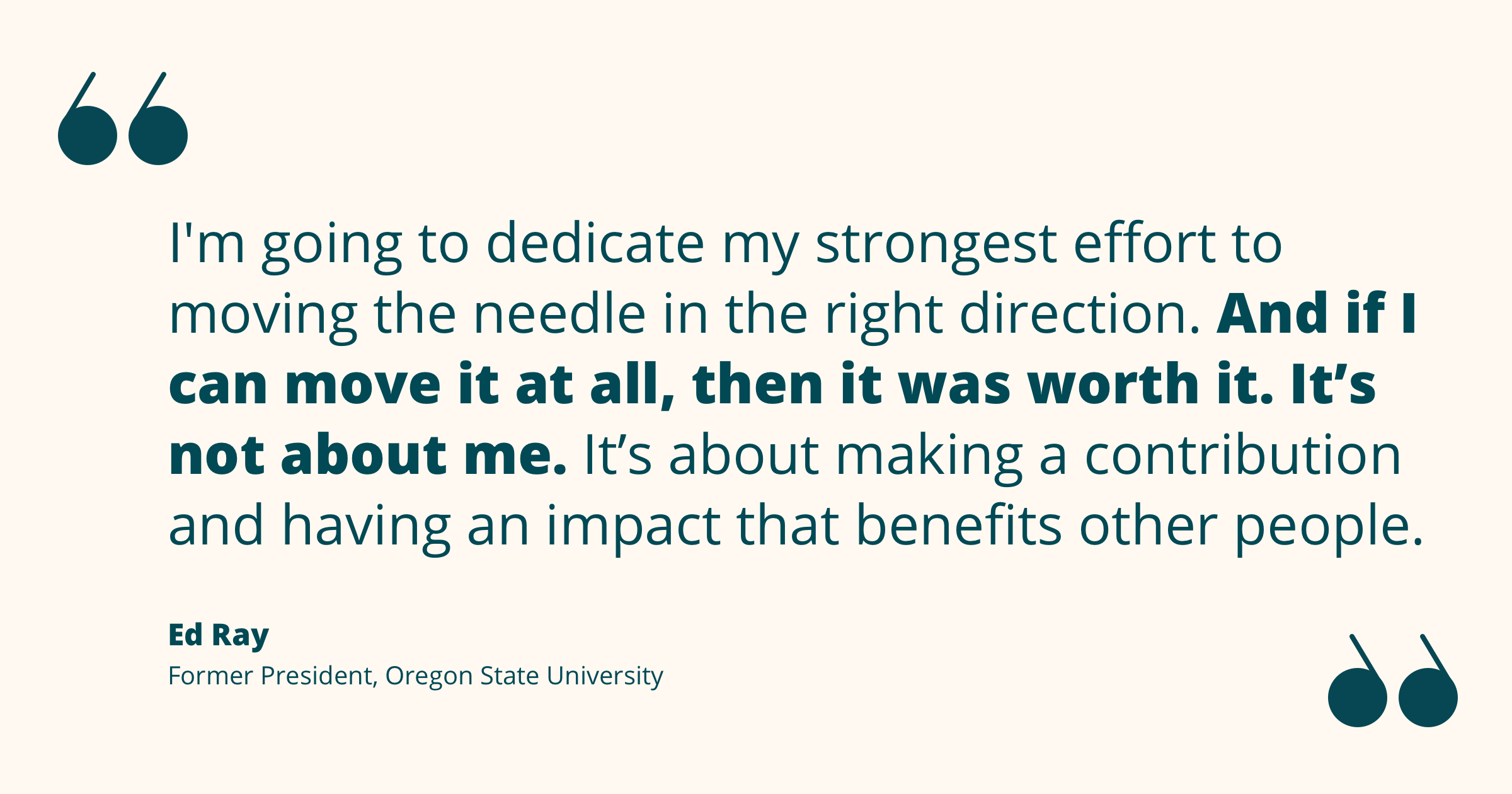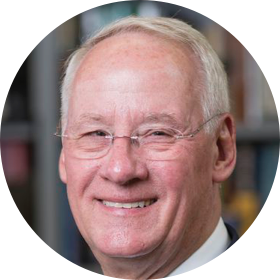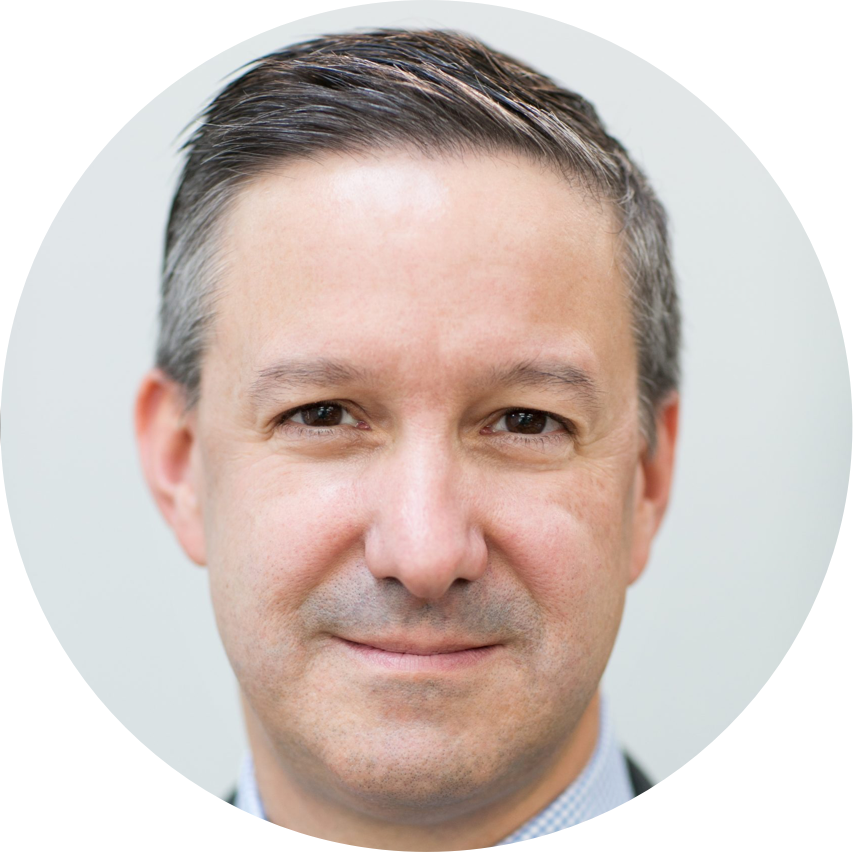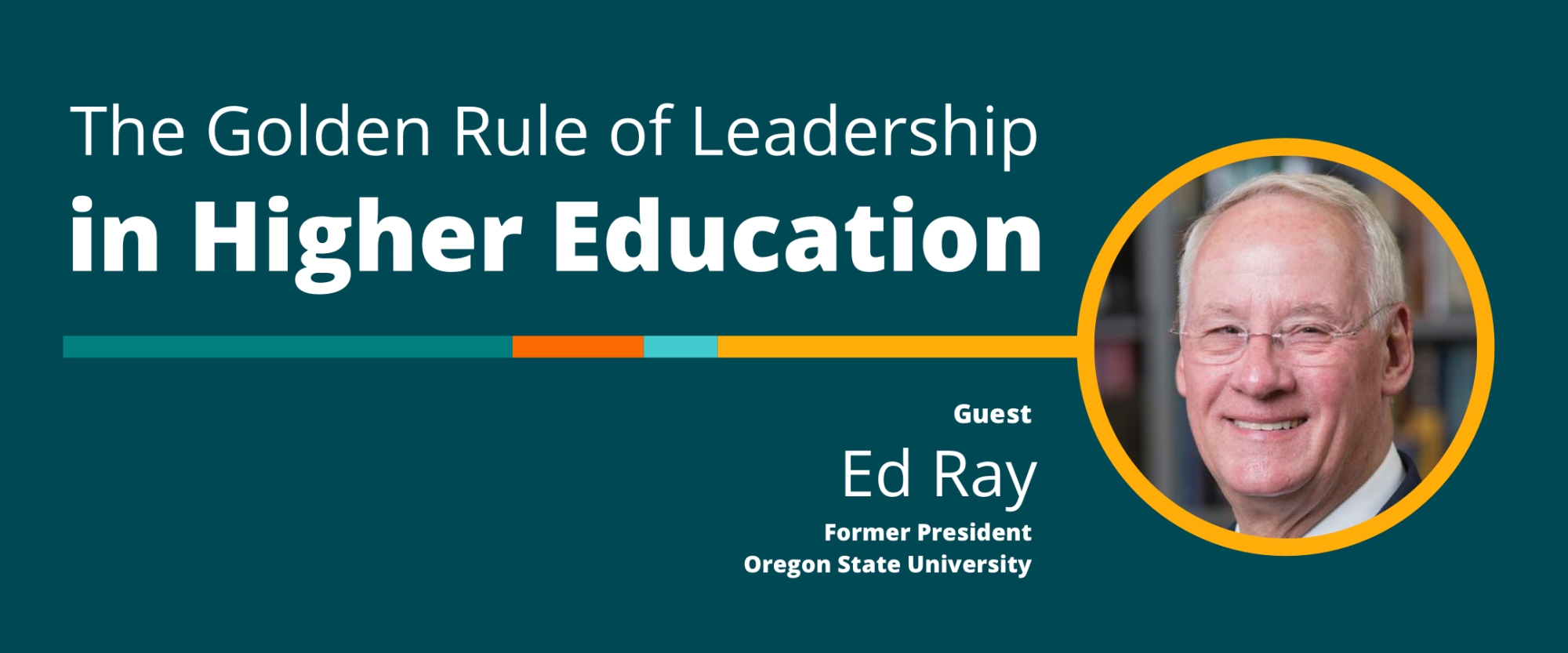Note: This interview, Episode 5 of the Weekly Wisdom Series, originally aired on May 11, 2020 as part of the University Innovation Alliance’s Innovating Together podcast, appearing live on Facebook, Twitter, and LinkedIn.
The University Innovation Alliance (UIA) is proud to present the Innovating Together podcast, weekly conversations that we're developing in partnership with Inside Higher Ed. I'm the Executive Director of the UIA, and my co-host is Jeff Selingo, author, journalist, and special advisor at Arizona State University. In our fifth conversation in the podcast's Weekly Wisdom series, we had the pleasure of speaking with Ed Ray, who was just completing his 17-year tenure as President of Oregon State University. Although we were discussing the challenges that the COVID-19 pandemic has visited on his institution, this was an uplifting conversation with a positive, forward-thinking leader, eager to share his wisdom with his successor, with his students, and with you.
The Golden Rule of Leadership
Although less than two months away from the end of his term as university leader, President Ray told us that he took no joy in stepping down. "If you’ve been in the midst of battle and you take your responsibility seriously, you’re never glad to get out of the fray," he said. "This is a time for people who are in leadership to step up and do their best." He believes that, amidst the unprecedented challenges of the COVID-19 pandemic, leaders must be honest about their limitations. "Anyone who tells you they got the book on what to do, they’re either a fool or they’re lying," he said bluntly. "We’re all figuring it out as we go along."
We asked President Ray what advice he'd give his successor. "I had a terrible department chair when I first started out," he recalled about his early days as a professor at Ohio State University. "When I was going to become a department chair, I decided on what I thought of as the golden rule of leadership: You should do everything you can to be the leader you wish you had. And that means you need to be honest, you need to be open, you need to be transparent, you need to be fair, you need to listen to people and actually care about their issues and try to help them solve them. You need to be about other people and being effective in their lives." He observed that leaders will always face challenges and crises, adding, "You don't have the luxury of feeling sorry for yourself and being woeful. Your job is to get everybody up and going again. I’ve had lots of different situations and that element never changes. You always have to be looking for positive steps to take based on the facts on the ground."
It's All About the Students
In the spirit of any true educator, President Ray's happiest memories have been spending time with his students. He told us, "Commencement is probably the most memorable occasion, seeing people launching careers and lives after studying at the university. There’s nothing quite as powerful as that." The topic reminded him of James Hilton's novella Goodbye, Mr. Chips, which he recently revisited. "I think if I could plot the perfect path for me going forward, I want to live it out like Mr. Chips," he said. "He spent his time always being associated with his school, always feeling a special affection and bond for the students that he knew. And that really was the most enriching part of his life. I think it’s an incredibly enriching part of my life."
However, as President Ray was quick to remind us, "I'm actually not retiring. I'm going to go on a sabbatical for a little while, then I'm going to go back as a professor of economics in the School of Public Policy, in the College of Liberal Arts."
Making a Contribution
Goodbye, Mr. Chips isn't the only mid-20th-century story from which President Ray draws his inspiration. "Most people would think this is kind of corny," he admitted, "but one of my favorite movies is It’s a Wonderful Life. And the amazing premise of that movie is he gets to see what his world would’ve been like if he had never lived or if he had died in an ice-skating accident when he was a child. And so that notion of always coming back and asking yourself, 'So how am I making a difference? What’s the value added?' – that’s what I need to be thinking about. It’s not self-directed. It’s other-directed."
Five years ago, at age 70, these thoughts led him to accept another five-year contract with Oregon State. "I care deeply about students, all students," he explained. "I care about students of color and students from rural areas and first generation and Pell eligible. And if you look at our performance and most other schools’ performance, we have not eliminated achievement gaps, six-year graduation rates, four-year graduation rates are not as high as they ought to be. And I said, 'I'm going to dedicate my strongest effort over the next five years to moving the needle in the right direction on each of those things. And if I can move it at all, then it was worth it.' It’s not about me. It’s about making a contribution and having an impact that benefits other people."

Resilience, Realism, and Technology
President Ray feels hopeful about the resilience of young people. Citing Tobias Wolff's Vietnam War memoir In Pharaoh’s Army, he told us, "At the end of the story, he says we’re genetically wired to be resilient and to persist because there’s a cycle to everyone’s life. And the mission in life is to get from the start to the finish, and it’s a journey of self-discovery." He believes that the pandemic is a defining experience for students. "I think this next generation is going to make incredible changes," he asserted.
He also applauds the work of his colleagues, who launched 4,000 courses in just one academic quarter. "Our online Ecampus enrollment is up over 13 percent," he said, noting that administrators have been brainstorming about what else could be achieved remotely. He gave an example under discussion with the Division of Student Affairs: "You could have people available through remote access on Zoom and other means so that when students have a 9:00 P.M. problem and not a 3:00 P.M. problem, they actually can contact another human being and maybe get some of the help that they haven’t been getting." While recognizing that campus life is built on in-person experiences, President Ray was realistic about the pandemic's lessons. "We’re losing a lot of unplanned interaction that can be very creative because things are so scheduled," he told us, "but I think there’s a much larger role for technology in the future of every college and university. This is a generation that is very comfortable visiting and talking and being very open online. And that’s only going to accelerate going forward."
Commencement Speech: The Short Version
Since commencement is such a powerful experience for President Ray, we concluded by asking him for his shortest possible speech, and he obliged us with this: "You need to be resilient. You need to be persistent. You need to never accept standing still. A football coach years ago said, 'You’re either getting better or you’re getting worse.' I think that’s right. So if you don't want to get worse, get better, get moving."
Links Mentioned in This Episode
• Oregon State University
• Goodbye, Mr. Chips
• It’s a Wonderful Life
• In Pharaoh’s Army
• Ecampus (Oregon State's online program)
Bios of Guest and Co-Hosts

Guest: Ed Ray, Professor of Economics, Oregon State University College of Liberal Arts
Dr. Edward J. Ray served as Oregon State University’s 14th president between 2003 and 2020. Under his leadership, Oregon State became an internationally recognized public research university and continues to expand the excellence, scope and impact of its services. During Dr. Ray's tenure, the O.S.U.-Cascades campus in Bend expanded to a four-year university in 2015 and opened a new 10-acre campus. He launched the Marine Studies Initiative, a university-wide effort involving all of Oregon State’s colleges and the O.S.U. Hatfield Marine Science Center in Newport. Enrollment grew to more than 30,000 students, and O.S.U. received high U.S. News & World Report rankings as a research university and for its online Ecampus program. Under Dr. Ray’s leadership, the university's first major capital campaign raised $1.14 billion for physical improvements, endowments, scholarships, and fellowships. Dr. Ray previously served at Ohio State University as executive vice president and provost from 1998 to 2003, prior to which he was a member of Ohio State's economics faculty for over 30 years. He received his bachelor’s degree in mathematics from Queens College (C.U.N.Y.) in 1966, and a master’s and Ph.D. in economics from Stanford University in 1969 and 1971, respectively.

Co-Host: Bridget Burns, Executive Director, University Innovation Alliance
Dr. Bridget Burns is the founding Executive Director of the University Innovation Alliance (UIA). For the past decade, she has advised university presidents, system chancellors, and state and federal policy leaders on strategies to expand access to higher education, address costs, and promote completion for students of all backgrounds. The UIA was developed during Bridget’s tenure as an American Council on Education (A.C.E.) Fellowship at Arizona State University. She held multiple roles within the Oregon University System, including serving as Chief of Staff and Senior Policy Advisor, where she won the national award for innovation in higher education government relations. She was a National Associate for the National Center for Public Policy and Higher Education, and has served on several statewide governing boards including ones governing higher education institutions, financial aid policy, and policy areas impacting children and families.

Co-Host: Jeff Selingo, author, journalist, special advisor at Arizona State University
Jeff Selingo is an author, a journalist, and a special advisor at Arizona State University. He has written about higher education for more than two decades and is a New York Times bestselling author of three books. His latest book, Who Gets In & Why: A Year Inside College Admissions, was published in September 2020 and was named an Editors’ Choice by the New York Times Book Review. A regular contributor to The Atlantic, Jeff is a special advisor for innovation and professor of practice at Arizona State University. He also co-hosts the podcast, FutureU. He lives in Washington, D.C. with his family.
About Weekly Wisdom
Weekly Wisdom is an event series that happens live on Facebook, Twitter, and LinkedIn. It also becomes a podcast episode. Every week, we join forces with Inside Higher Ed and talk with a sitting college president or chancellor about how they're specifically navigating the challenges of this moment. These conversations will be filled with practicable things you can do right now by unpacking how and why college leaders are making decisions within higher education. Hopefully, these episodes will also leave you with a sense of optimism and a bit of inspiration.
Rate, Review & Subscribe
Learn why hundreds of people have rated this new podcast 5 stars! Please join others and rate and review this podcast. This helps us reach and inform more people -- like you -- to help increase the number and diversity of college graduates in the United States.
Click here, scroll to the bottom, tap to rate with five stars, and select “Write a Review.” Then be sure to let us know what you loved most about the episode! Also, if you haven’t done so already, subscribe to the podcast. We’ll be adding a bunch of bonus episodes to the feed and, if you’re not subscribed, there’s a good chance you’ll miss out.

